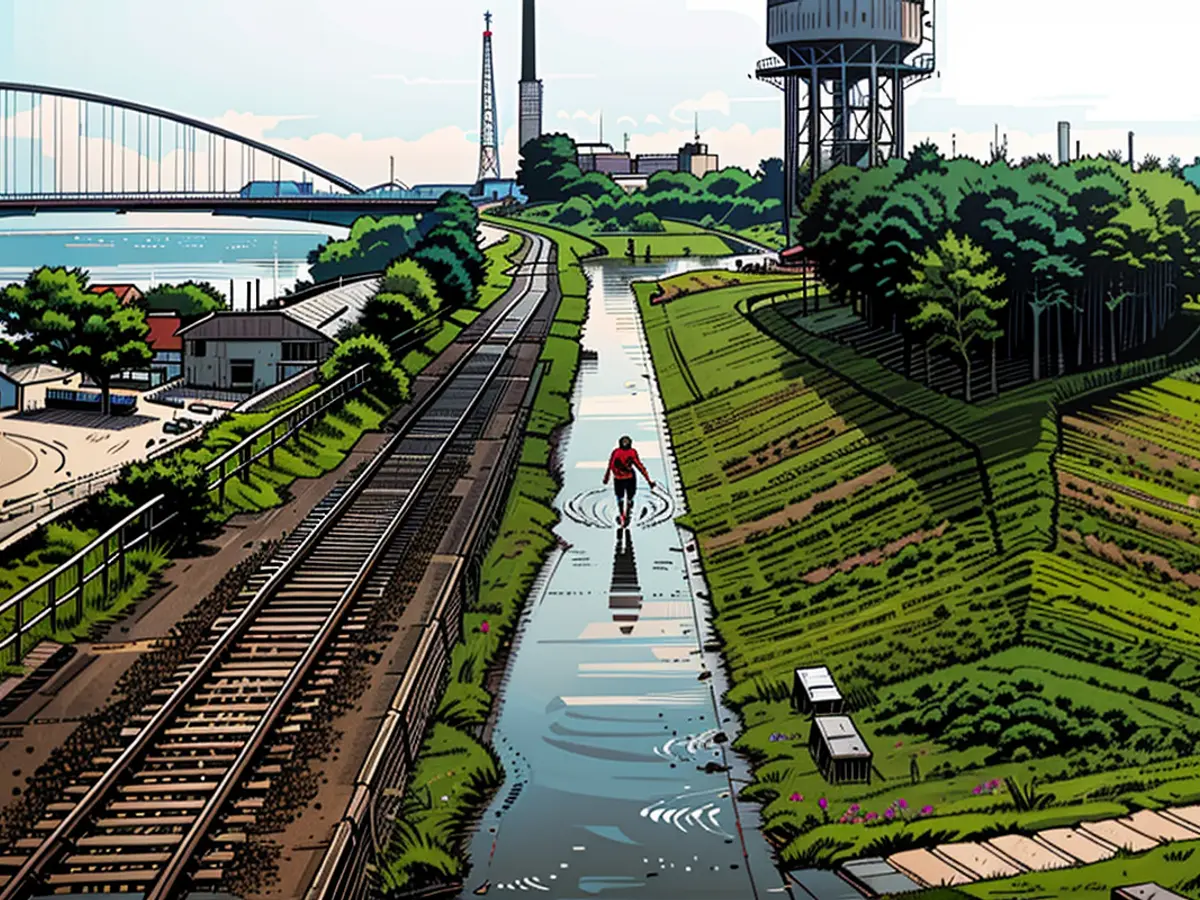Green Change - Garden Festival: Ruhr Area preparing for climate change
Three years before the International Garden Exhibition (IGA) in the Ruhr Region, the plans for the large-scale project become concrete. Five central "Future Gardens" and several dozen smaller projects are planned to be built throughout the Ruhr Region. Everywhere it's about the question of how large urban areas like the Ruhr Region can adapt to the consequences of climate change in the future. At least 2.6 million people are expected to attend the IGA from April to October 2027.
"The question is: How do we want to live tomorrow? How can the Ruhr Region remain livable?", says IGA managing director Horst Fischer. Densely populated urban neighborhoods with many sealed surfaces have particular challenges with the consequences of climate change: The air heats up more strongly in the heat - during heavy rain, water cannot seep in anywhere and causes even greater damage.
"That's why we need to make sure that we get more green in the cities in these neighborhoods", says Fischer. The Ruhr Region will thus become a piece more resilient against the effects of climate change. Two hundred million euros will be invested in total in the context of the garden exhibition.
IGA as a laboratory for the green metropolis of tomorrow
The main venues of the IGA are the five Future Gardens. "They are laboratories and showcases for a green metropolis of tomorrow", says co-managing director Nina Frense. "We want to give ideas on how cities, companies, but also people directly can adapt to a changing climate - and that will become increasingly important for our economy in the future."
In Dortmund, the area around the Hansa Coke Works is at the center of the Future Garden. Where coal was once produced for the steelworks of the Ruhr Region, a city park with space for art, culture and events is to be created - similar to the Zeche Zollverein site in Essen.
In Gelsenkirchen, the Emscher Island is to focus on ecological themes and dealing with water. An old turning basin for ships on the Rhine-Herne Canal is also to be made accessible to visitors.
In Duisburg, green and recreational areas with a skate park and new playgrounds are being created. The area along the Rhine was industrially used for 150 years and was previously inaccessible to people.
In Castrop-Rauxel, a leisure park is being created directly on the water: Where the Emscher River once carried sewage from the Ruhr Region, a water leisure park, meadow orchards or a vineyard are being created. In addition, a new promenade is to connect the park with Recklinghausen, Herne and Herten.
In Bergkamen and Lünen, an old coke plant site between the Datteln-Hamm Canal and Lippe is being transformed into a landscape park. The center of this will be recreational offerings for the future - with active and trend sports offerings.
Investments in structurally weak housing estates
From these flagship projects of the IGA, above all structurally weak housing estates are to benefit. "We go to places where people don't live with thick wallets, who don't have big gardens behind their houses", emphasizes Frense. "It's important that there is added value from the green transformation, that it becomes nicer and more livable."
Besides these five major projects, many cities in the Ruhr Area plan their own, smaller measures within the framework of the IGA. Mostly, it's about further developing public parks, gardens, and landscapes. Associations, schools, or balcony gardeners should also be involved with their small gardens. For modern mobility, the bicycle network between the Ruhr Area cities is to be expanded.
An International Garden Exhibition takes place in Germany every ten years. It's the first time that an IGA is taking place in North Rhine-Westphalia.
IGA
- The large-scale project for the International Garden Exhibition (IGA) in the Ruhr Area aims to address the challenges of climate change in large urban areas, such as the Ruhr Region, by implementing green spaces and adapting infrastructure.
- Recognizing the impact of climate change on densely populated areas with many sealed surfaces, the IGA in the Ruhr Area is focusing on creating more green spaces to mitigate the effects of heat and water runoff.
- As part of the IGA in North Rhine-Westphalia, the Ruhr Region is investing a total of 200 million euros in green transformations and future gardens, aiming to become more resilient against climate change's effects.
- Beyond the major projects, various cities within the Ruhr Area plan their own smaller initiatives within the IGA framework, emphasizing public parks, gardens, and landscapes' development to contribute to a greener and more sustainable future.








